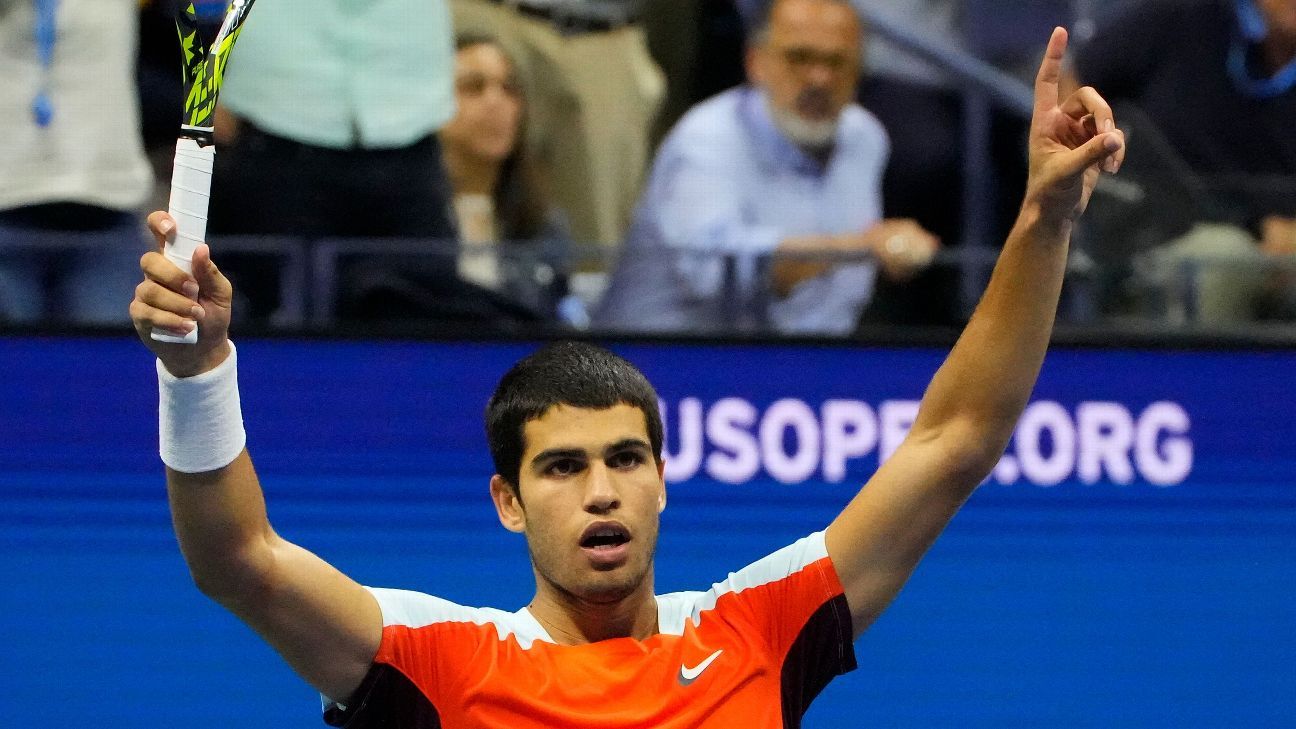NEW YORK — This was a match that would not end. Should not end, one might say. Carlos Alcaraz and Jannik Sinner, two of the brightest young stars of men’s tennis, traded shots of the highest quality and countless momentum swings across five sterling sets for 5 hours, 15 minutes until Alcaraz finally won the last point at 2:50 a.m. Thursday, the latest finish in US Open history.
It was “only” a quarterfinal, no trophy at stake, yet was as taut a thriller as this tournament has produced or, likely, will, a tour de force of big cuts on the full sprint and plenty of guts, a 6-3, 6-7 (7), 6-7 (0), 7-5, 6-3 victory for the No. 3-seeded Alcaraz, a 19-year-old from Spain.
“Honestly,” said Alcaraz, who saved a match point in the fourth set at Arthur Ashe Stadium, “I still don’t know how I did it.”
He also used words such as “unbelievable” and “amazing.” No hyperbole there.
“This one will hurt for quite a while,” said No. 11 Sinner, a 21-year-old from Italy. “But tomorrow, I will wake up — or today, I will wake up — trying to somehow [take away] only the positives.”
When the 382nd, and final, point was over, Sinner and Alcaraz hugged each other. A handshake at the net would not suffice.
Alcaraz, whose five-set victory over 2014 US Open champion Marin Cilic ended at 2:23 a.m. Tuesday, reached his first Grand Slam semifinal and is the youngest man to get that far at the US Open since Pete Sampras won the title at 19 in 1990. Alcaraz, who has a chance to move up to No. 1 in the rankings next week, will face No. 22 Frances Tiafoe of the United States on Friday. The other men’s semifinal that day is No. 5 Casper Ruud of Norway vs. No. 27 Karen Khachanov of Russia.
This match began Wednesday evening at about 9:35 p.m. and easily surpassed the previous mark for latest time of finish at the US Open, which had been 2:26 a.m., shared by three matches.
Not only did this one run late, it ran long: Only a 5-hour, 26-minute match between Stefan Edberg and Michael Chang in 1992 took more time at the US Open.
“I always say you have to believe in yourself all the time,” Alcaraz said. “The hope is the last thing that you lose.”
After his much more mundane, three-set victory over Andrey Rublev in a quarterfinal that ended at about 4:45 p.m. Wednesday, Tiafoe was rather prescient when asked about Alcaraz and Sinner.
“I just hope they play a marathon match, super-long match,” Tiafoe said with a smile, “and they get really tired come Friday.”
Asked afterward how he was feeling physically out there against Sinner, Alcaraz began with a quick response: “I felt great.” Then he paused, and smiled, before continuing: “Well, probably at the end of the match, I was [at] my end.”
It was already past 2 a.m. when Coco Gauff, the 18-year-old American who was the runner-up at the French Open and bowed out in the US Open quarterfinals on Tuesday, spoke for anyone paying attention to Alcaraz vs. Sinner when she tweeted: “this match is insane. I leave at 6am for the airport but I refuse to sleep and miss this. #Sinner #Alcaraz”
Still, even with thousands and thousands of empty seats, there were enough who remained on hand to make as much noise as a full house at times. Both players would wave their rackets or motion with their arms to encourage the fans to get even louder. And, naturally, the fans would oblige.
“Could have finished in three sets. Could have finished in four sets. Could have finished in five sets,” Sinner said. “We both wanted to win, for sure. We both tried our best.”
It was as back-and-forth as could be. The highlights were too many to list. Just one: Alcaraz won one point after extending a rally by wrapping his racket behind his back to make contact with the ball. One more: Alcaraz fell onto his backside, then sprung up to race to smack a backhand that won that point.
After taking the first set, Alcaraz held five set points in the second — but Sinner saved them all.
In the third, Alcaraz broke to lead 6-5 and served for that set — but Sinner broke to force a tiebreaker that he dominated.
In the fourth, it was Sinner who served for the victory at 5-4, even coming within a point of victory there — but Alcaraz broke there and wound up pushing what already was a masterpiece to a fifth.
And in the fifth, after another memorable shot — a running backhand passing winner that sailed just past Sinner’s outstretched arm — to earn a break point and a chance for a 5-3 lead, Alcaraz put a finger to his ear.
He would convert that chance, then serve it out. When the end arrived, Alcaraz dropped to his back, his chest heaving, and covered his face with his hand.
